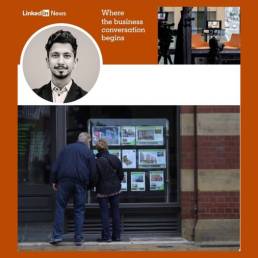Tenants in Britain are experiencing the highest increase in rent in years. Last month in London, average rent hit a record £553 per week, with 29 renters typically competing for each property.
– LinkedIn News, 21 October 2022
– LinkedIn News, 21 October 2022
Across the UK, private rent rose by 3.6% in the 12 months to September, the largest growth since the Office for National Statistics started keeping records in 2016.
To help tenants amid a cost of living squeeze, the Scottish government announced a rent freeze for both public and private properties in September. The UK government, too, has been considering a rent cap, but only for social housing for now.
Social housing providers say a low rent cap when inflation is at a 40-year high could prevent them from investing in their properties to make them safer for the residents.
Meanwhile, housing market experts say buy-to-let landlords faced with high-interest rates could be forced to sell their properties, further reducing the supply.
Do you think rent freezes and caps is a step in the right direction, or could it add to the housing problem?
David Smith JMW says, “the Scottish Government is introducing a form of 3rd Generation Rent Control. This means that rents are controlled inside tenancies but float to market levels between tenancies. This has been tried before, most recently in Berlin (who abandoned it). The problem is that it does not really control prices. Over the longer-term rents rise by about the same rate as the market level still comes in. Inside tenancies rents are held down but this tends to happen anyway to some degree. What this form of rent control does do is massively reduce property churn as tenants tend to stay in existing properties (where the rent is controlled) rather than re-enter the open market (where rent is not controlled). Therefore tenants tend to stay in properties, even where they do not really meet their needs, in order to retain the price cap benefit. This tends to reduce overall economic mobility and also means that newcomers cannot obtain properties, thus driving up rents in the open market and further entrenching the desire of tenants to remain in place. Given that Scotland (and England) have a shortage of property available which is driving rents up adding this pressure as well is very likely to make the situation in Scotland worse not better. The academic evidence on rent controls has shown similar effects in several different places.”

